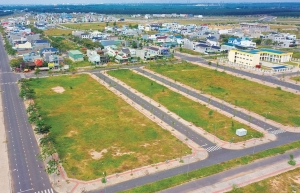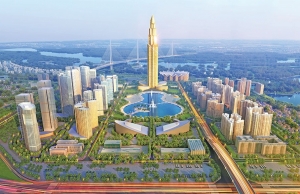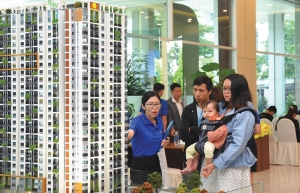Real estate ranks high in 2023 foreign investment interest
 |
| Singapore and Malaysia are among the movers and shakers in this country’s property arena, photo Le Toan |
Malaysian property company United Overseas Australia (UOA) in December was one of the latest major names to announce a joint venture agreement with CapitaLand Vietnam Holdings to develop a $247 million property project in Vietnam.
The development budget will be funded by each party in proportion of their respective ownership, with UOA’s share coming to just over 30 per cent.
Previously, UOA has developed a number of real estate projects in Ho Chi Minh City such as the UOA Tower, MarQ, and Millennial Tower in the Phu My Hung township.
Meanwhile, during the cooperation signing ceremony with distribution partners that took place in early December, CapitaLand Development revealed the names of those accompanying the development of Lumi Hanoi: Mitsubishi Estate and Far East Organization.
Lumi Hanoi is the first residential real estate project for Far East in the Vietnamese market. Previously, its resort subsidiaries also signed a cooperation agreement to fund two boutique hotels in Ho Chi Minh City.
As for Mitsubishi Estate, it is the company’s third real estate deal, after previous activities in office buildings and luxury apartments in Ho Chi Minh City and Binh Duong province.
According to the Foreign Investment Agency under the Ministry of Planning and Investment, as of December 20, the total registered foreign investment capital in Vietnam reached nearly $36.6 billion, an increase of 32 per cent compared with the same period last year.
Real estate ranked second in terms of sectors with nearly $4.67 billion, accounting for more than 12.7 per cent of the total registered capital, an increase of 4.8 per cent.
During the year, 111 countries and territories put money in Vietnam. Of which, Singapore currently leads with a total amount of more than $6.8 billion. This accounts for 18.6 per cent and shows an increase of 5.4 per cent over the same period in 2022.
Singapore has emerged as the leading investor in real estate in Vietnam, with familiar names such as CapitaLand, Keppel Land, Mapple Tree, and Sembcorp.
Notably, foreign funding has expanded through a series of large-scale manufacturers such as Samsung, Intel, Foxconn, Pegatron, Goertek, and Lego with projects worth billions of dollars.
In 2023, a series of large-scale ventures were implemented in Vietnam, such as by Compal and Quanta Computer. The increase in the manufacturing sector has improved the demand for industrial zones, deemed a good foundation for the improvement in industrial property and logistics.
“Recent shifts have brought positive changes to Vietnam’s industrial real estate market. The amount of foreign investment flowing strongly into Vietnam causes the demand for industrial real estate to increase, and the wave of funding in industrial real estate is increasingly expanding,” said senior manager of industrial real estate at Savills Hanoi, Thomas Rooney.
According to vice chairman of Vietnam Real Estate Brokers Association Tran Van Binh, industrial and residential real estate are two segments that are recording many signs of return from domestic and international investors, and the market has become more bustling with project merger and acquisition activities.
“To help the domestic real estate market become vibrant, as well as retain highly qualified human resources, the Vietnamese government has increased the supply of real estate, building products suitable for housing needs and foreign funding in Vietnam. At the same time, it has introduced regulations and created better conditions for non-nationals to buy real estate in Vietnam,” Binh said.
 | Critical juncture set for real estate prospects in 2024 Despite fluctuations expecting to continue in the Vietnamese real estate market for some months, industry analysts are quietly optimistic that 2024 will mark a turning point for a new cycle of recovery and development. |
 | Japanese investors catch the eye in real estate sector Many domestic real estate developers are expecting to cooperate with Japanese investors as strategic partners to receive capital and share the management capacity. |
 | New real estate law to clean up conditions The new Real Estate Business Law, passed by the National Assembly in November and effective from 2025, could narrow the scope of regulation and tighten conditions for transferring real estate projects. |
What the stars mean:
★ Poor ★ ★ Promising ★★★ Good ★★★★ Very good ★★★★★ Exceptional
Related Contents
Latest News
More News
- Dong Nai experiences shifting expectations and new industrial cycle (January 28, 2026 | 09:00)
- An Phat 5 Industrial Park targets ESG-driven investors in Hai Phong (January 26, 2026 | 08:30)
- Decree opens incentives for green urban development (January 24, 2026 | 11:18)
- Public investment is reshaping real estate’s role in Vietnam (January 21, 2026 | 10:04)
- Ho Chi Minh City seeks investor to revive Binh Quoi–Thanh Da project (January 19, 2026 | 11:58)
- Sun Group launches construction of Rach Chiec sports complex (January 16, 2026 | 16:17)
- CEO Group breaks ground on first industrial park in Haiphong Free Trade Zone (January 15, 2026 | 15:47)
- BRIGHTPARK Entertainment Complex opens in Ninh Binh (January 12, 2026 | 14:27)
- Ho Chi Minh City's industrial parks top $5.3 billion investment in 2025 (January 06, 2026 | 08:38)
- Why Vietnam must build a global strategy for its construction industry (December 31, 2025 | 18:57)

 Tag:
Tag:



















 Mobile Version
Mobile Version